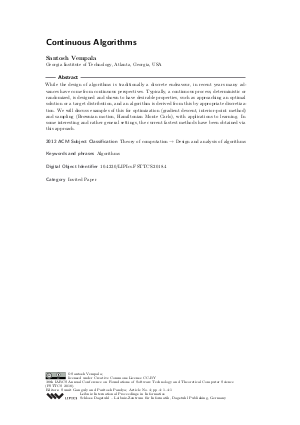Continuous Algorithms (Invited Paper)
Author Santosh Vempala
-
Part of:
Volume:
38th IARCS Annual Conference on Foundations of Software Technology and Theoretical Computer Science (FSTTCS 2018)
Part of: Series: Leibniz International Proceedings in Informatics (LIPIcs)
Part of: Conference: IARCS Annual Conference on Foundations of Software Technology and Theoretical Computer Science (FSTTCS) - License:
 Creative Commons Attribution 3.0 Unported license
Creative Commons Attribution 3.0 Unported license
- Publication Date: 2018-12-05
File

PDF
LIPIcs.FSTTCS.2018.4.pdf
- Filesize: 156 kB
- 1 pages
Document Identifiers
Subject Classification
ACM Subject Classification
- Theory of computation → Design and analysis of algorithms
Keywords
- Algorithms
Metrics
- Access Statistics
-
Total Accesses (updated on a weekly basis)
0PDF Downloads0Metadata Views
Abstract
While the design of algorithms is traditionally a discrete endeavour, in recent years many advances have come from continuous perspectives. Typically, a continuous process, deterministic or randomized, is designed and shown to have desirable properties, such as approaching an optimal solution or a target distribution, and an algorithm is derived from this by appropriate discretization. We will discuss examples of this for optimization (gradient descent, interior-point method) and sampling (Brownian motion, Hamiltonian Monte Carlo), with applications to learning. In some interesting and rather general settings, the current fastest methods have been obtained via this approach.
Cite As Get BibTex
Santosh Vempala. Continuous Algorithms (Invited Paper). In 38th IARCS Annual Conference on Foundations of Software Technology and Theoretical Computer Science (FSTTCS 2018). Leibniz International Proceedings in Informatics (LIPIcs), Volume 122, p. 4:1, Schloss Dagstuhl – Leibniz-Zentrum für Informatik (2018)
https://doi.org/10.4230/LIPIcs.FSTTCS.2018.4
BibTex
@InProceedings{vempala:LIPIcs.FSTTCS.2018.4,
author = {Vempala, Santosh},
title = {{Continuous Algorithms}},
booktitle = {38th IARCS Annual Conference on Foundations of Software Technology and Theoretical Computer Science (FSTTCS 2018)},
pages = {4:1--4:1},
series = {Leibniz International Proceedings in Informatics (LIPIcs)},
ISBN = {978-3-95977-093-4},
ISSN = {1868-8969},
year = {2018},
volume = {122},
editor = {Ganguly, Sumit and Pandya, Paritosh},
publisher = {Schloss Dagstuhl -- Leibniz-Zentrum f{\"u}r Informatik},
address = {Dagstuhl, Germany},
URL = {https://drops.dagstuhl.de/entities/document/10.4230/LIPIcs.FSTTCS.2018.4},
URN = {urn:nbn:de:0030-drops-99037},
doi = {10.4230/LIPIcs.FSTTCS.2018.4},
annote = {Keywords: Algorithms}
}
